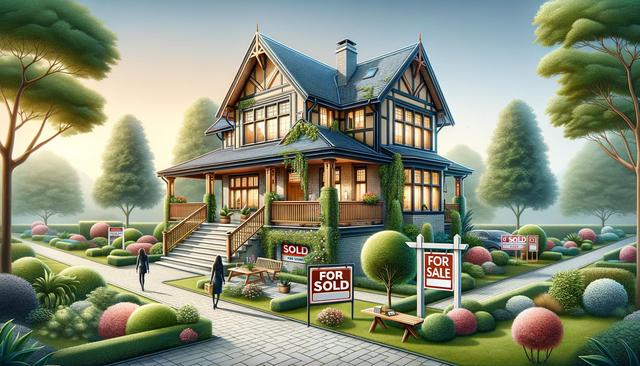Essential Tips to Sell Your House Fast Without the Stress
Discover tips you must know to sell your house fast. From staging your home to pricing it right, these strategies help attract buyers quickly, ensuring a smooth and profitable sale with minimal stress and maximum results.

Start with the Right First Impression
When selling your house, first impressions matter more than many realize. Curb appeal plays a significant role in attracting potential buyers. A well-maintained exterior immediately signals that the home has been cared for, setting the stage for positive expectations. To boost your home’s curb appeal, consider simple upgrades like painting the front door, trimming bushes, planting seasonal flowers, and ensuring walkways are clean and inviting. These changes don’t require major investment but can have a strong impact on buyer interest.
Inside the home, focus on cleanliness and decluttering. Buyers want to envision themselves living in the space, so removing personal items, minimizing furniture, and organizing storage areas can help them see the home’s potential. Light a few scented candles or use mild air fresheners to create a welcoming aroma. Lastly, ensure all lights work and allow in as much natural light as possible to make each room feel more spacious and inviting.
Set a Competitive and Realistic Price
Pricing your home correctly is one of the most important factors when trying to sell quickly. Overpricing can deter potential buyers, while underpricing might leave money on the table. Conducting a comparative market analysis can give you insight into what similar homes in your area are selling for. This data helps in setting a price that is both competitive and fair.
Consider consulting a real estate professional who has local market knowledge. They can help interpret current trends and guide you in choosing a price that aligns with buyer expectations. Here are a few pricing strategies that can encourage faster sales:
- List slightly below market value to generate more interest and possible bidding competition.
- Use psychological pricing, such as $299,000 instead of $300,000, to appeal to price-conscious buyers.
- Be prepared to adjust your price based on feedback and market response within the first few weeks.
Remember, the longer a home sits on the market, the more likely buyers may assume something is wrong with it, so a well-planned pricing strategy is essential.
Stage Your Home for Success
Home staging involves arranging furniture, decor, and lighting in a way that highlights your home’s strengths and helps potential buyers connect emotionally with the space. While professional staging can be a great option, many homeowners can achieve impressive results with some basic tips and minimal cost.
Key staging tips include:
- Use neutral colors for walls and decor to appeal to a wider range of buyers.
- Arrange furniture to maximize space and flow through each room.
- Add small touches like fresh flowers, mirrors to reflect light, and cozy throws to make spaces feel welcoming.
Don’t forget the importance of staging key areas such as the kitchen, living room, and master bedroom. These areas often influence buying decisions the most. Also, consider staging outdoor spaces such as patios or balconies to showcase additional living space. Creating an environment where buyers can imagine their lifestyle unfolding can significantly increase your chances of a faster sale.
Market Your Property Effectively
Even a perfectly staged and priced home won’t sell quickly if the right people don’t know it’s available. Effective marketing ensures your listing reaches a broad audience and generates interest from serious buyers. Start with high-quality photos—well-lit, professional images can make a listing stand out among dozens of others online.
Use multiple platforms to promote your listing, including:
- Online real estate marketplaces
- Social media platforms
- Local community boards and real estate groups
- Email newsletters or marketing campaigns
Craft a compelling listing description that highlights the most attractive features of the home, such as recent upgrades, location advantages, or energy-efficient appliances. Mention any unique selling points that could appeal to specific buyer groups, like families, professionals, or retirees.
Additionally, hosting virtual tours or live video walkthroughs can engage remote buyers or those who prefer to browse from home. The wider your property’s exposure, the more likely you are to attract the right buyer faster.
Be Flexible and Responsive
One of the most overlooked aspects of selling a home quickly is the importance of flexibility. Buyers often want to view properties on short notice, and being accommodating with showing times can significantly increase your chances of closing a deal sooner. If possible, make your home available for evening and weekend showings to match busy schedules.
It’s also important to respond promptly to inquiries, feedback, and offers. A delayed response can signal a lack of interest or seriousness, potentially leading buyers to move on to other properties. Work closely with your real estate agent—or take an active role yourself—to ensure communication is swift and professional throughout the process.
When offers do come in, be open to negotiation. While it’s important to know your home’s value, being too rigid on price or terms can slow down or derail potential sales. Evaluate each offer based on its full terms, not just the price—factors like closing timelines, contingencies, and buyer financing can all affect the overall quality of an offer.
Conclusion: Closing the Sale with Confidence
Selling your house fast doesn’t have to be a stressful experience. By creating a strong first impression, pricing your home strategically, staging it thoughtfully, marketing it effectively, and maintaining flexibility throughout the process, you improve your chances of a timely and profitable sale. These practical tips equip you to navigate the selling journey with confidence, helping you move forward smoothly toward your next chapter.